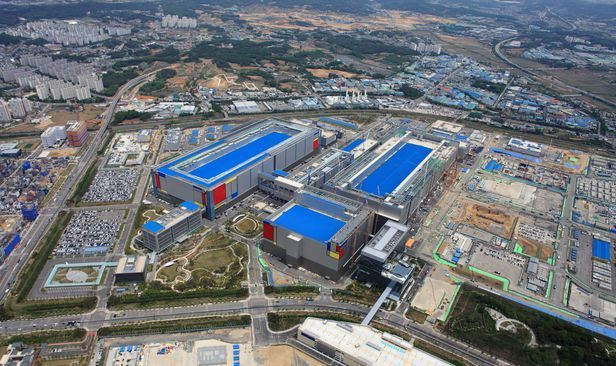|
Samsung Electronics chip factory in Pyeongtaek, South Korea. (Samsung Electronics) |
Samsung Electronics Co. is expected to announce mass production of 3-nanometer semiconductors next week, sources said Wednesday, beating foundry rival TSMC in the advanced chipmaking process.
The next-generation 3nm chips will be built on Gate-All-Around (GAA) technology, which Samsung says will enable up to 45% area reduction while delivering 30% better performance and lower power consumption. 50% smaller than existing FinFET. treat.
The South Korean tech giant presented its 3nm chips to US President Joe Biden last month during his visit to Samsung’s Pyeongtaek complex, the world’s largest semiconductor factory located about 70 kilometers south of Seoul.
TSMC, the world’s largest contract chipmaker, said it would begin mass production of 3nm chips in the second half of the year.
The two companies have been in fierce competition to outdo each other in bringing the most advanced and efficient chips to the mass market and to win customers for contract chip manufacturing.
Samsung, the world’s largest memory chipmaker and second-largest foundry player, said its 2nm process node is in the early stages of development, with mass production planned for 2025.
According to industry tracker TrendForce, TSMC took 53.5% of the global foundry market, followed by Samsung with 16.3%, in the first quarter of this year.
“The first is technology, the second is technology, and the third is also technology,” Samsung Electronics Vice President Lee Jae-yong said after returning from a business trip to Europe at the start. of the month.
Lee visited Dutch chip equipment manufacturer ASML to expand chip cooperation and purchase of ASML’s extreme ultraviolet (EUV) lithography systems, which are essential for the production of advanced chips.
In 2019, Samsung unveiled a massive 171 trillion won ($151 billion) investment plan in the logic chip and foundry sectors by 2030, as the tech giant plans to expand its leadership beyond the memory sector. (Yonhap)






More Stories
Delay in mass production of new Intel products is a boon for AMD, share of AMD x86 server processors expected to exceed 22% in 2023, according to TrendForce
Quantum industry milestone brings mass production of quantum chips closer
NEO Battery Materials provides updates on installation of additional equipment for mass production optimization and final stages of commercial plant design for construction